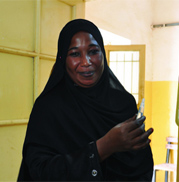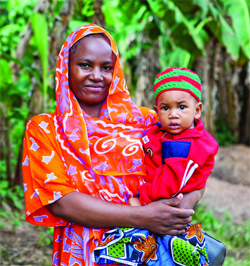 This is a story in which capital markets – the complex, cold world of high finance, banking and bonds – save the lives of millions of children.
This is a story in which capital markets – the complex, cold world of high finance, banking and bonds – save the lives of millions of children.
Most of us known little and care less about financial markets, save for the odd headline about bankers’ bonuses or trouble in the Eurozone.
But a clever approach to fundraising is using promises of future investment in vaccines to save the world’s poorest children today.
The story begins in the year 2000 when vaccines were already seen as a great investment in developing countries – almost on a par with spending on primary education.
Glossary
Gavi, the Vaccine Alliance is a public private partnership bringing together UNICEF, the WHO, the Bill & Melinda Gates Foundation, the World Bank, vaccine manufacturers, NGOs, national governments and others to improve access to vaccines in the poorest countries of the world.
Bonds are issued by governments or companies when borrowing money. They are a promise to repay the money borrowed – with interest – on a certain date. For example, Germany could borrow €100 million for 20 years at 1%.
Sukuks are financial instruments used to raise funds from investors in compliance with Islamic law. Under the principle of Islamic finance, investments should not carry a fixed predetermined amount of income (i.e. interest). Investors can, however, share in the profit from an investment.
The challenge was to get the vaccines to those who were in most need but had the fewest resources.
The WHO, Unicef, philanthropists, governments, vaccine companies and NGOs came together to improve access to vaccines, giving birth to an organization now called Gavi, the Vaccine Alliance.
Gavi has already immunised around half a billion children who would not otherwise have been protected against vaccine-preventable illnesses and plans to save many more.
This remarkable achievement requires money. And, while Gavi has successfully negotiated lower prices for vaccines while expanding the vaccine market size, delivering vaccines around the world would be impossible without donations from governments in wealthy countries as well as from philanthropists – such as Bill Gates.
Sophisticated financial wizardry also helps to maximise the impact of funds. This is where the International Finance Facility for Immunisation (IFFIm) comes in.
On behalf of Gavi, IFFIm sells bonds (see glossary) on financial markets to raise money for vaccines. This is possible because those bonds are backed by legal pledges from sovereign nations – the UK, France, Italy, Norway, Australia, Spain, the Netherlands, Sweden and South Africa.
“It’s a financial mechanism that allows frontloading of these pledges,” IFFIm Chair René Karsenti told Vaccines Today. “Clearly the children cannot wait.”
He said IFFIm is an efficient way to raise money, using the World Bank as its treasury manager and availing of the expertise of its board of expert volunteers. “It is an efficient way to transfer funds into a noble cause,” Karsenti said. “This is where capital markets can save lives.”

Islamic finance
Socially-responsible investments are increasingly attractive to certain kinds of investors, not least those seeking to follow the principles of Islamic finance.
This inspired IFFIm to develop a new way to attract funds from Gulf countries and beyond by issuing its first ‘sukuk’ (see glossary). The three-year sukuk raised US$500 million late last year and was oversubscribed – meaning demand from investors was high.
This landmark transaction was the first socially responsible sukuk with funds to be utilised for Gavi immunisation programmes. Around one in five of those who invested were based in Asia; one in ten was in Europe, with just under 70% based in the Middle East and Africa.
The money will help buy vaccines and strengthen health systems in developing nations, a number of which are predominantly Muslim. “The funds will be used to protect children near and far – in countries from Yemen and Mali to Afghanistan and Indonesia – from deadly diseases,” said Karsenti.
What the experts say
“The use of proceeds – to help finance the delivery of life-saving vaccines and related health system strengthening support to many of the world’s poorest nations – is well aligned with the core principles of Islamic finance,” said Madelyn Antoncic, Vice President and Treasurer of the World Bank, IFFIm’s Treasury Manager.
“This issuance is testament to the growing interest among international issuers to tap the Islamic investment pool and the rising demand by both Islamic and conventional investors to subscribe to high-quality Sukuk,” said Afaq Khan, CEO Islamic Banking, at Standard Chartered Bank.
“In a year of landmark Sukuk issuances, the IFFIm debut Sukuk stands out in terms of the opportunity it gives Sukuk investors to be directly part of an initiative that improves the wellbeing of those in need,” said Khalid Al-Subeai, Acting CEO at Barwa Bank.
“We hope that the success of the IFFIm Sukuk will pave the way for more socially-responsible type Sukuk to be issued in the near term,” said Tengku Dato’ Zafrul Tengku Abdul Aziz, Acting Group CEO at CIMB Group Holdings Berhad.
“It is noteworthy not only as the first-ever socially responsible Vaccine Sukuk but also in evidencing the significant buy-side appetite from Middle Eastern investors for high-grade international credits,” said Andy Cairns, Global Head of Debt Origination and Distribution at NBAD.
“The strong appetite from investors is a reflection of both the increasing role of Sukuk in providing financing solutions globally, and the support for the vital contributions that Gavi makes to improve the lives of children where the need is greatest,” said Sarah Al-Suhaimi, CEO of NCB Capital.




